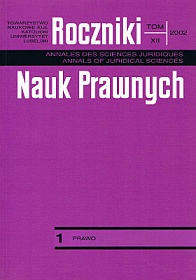The Range of Estate and Financial Privileges of the Religious Orders during the Enlightenment
Abstract
The paper shows changes that took place as regards estate and financial privileges of the religious orders during the Enlightenment. Those changes were considerably due to new trends aimed against the Church. Under their influence. both the lay and the religious clergy were criticized. Such people as H. Kołłątaj, J. U. Niemcewicz, J. Kitowicz, or S. Staszic accused them of too much concern about material goods and negligence in their religious functions. At the same time, they postulated to increase their financial burden and allocate it to the state under reform in King Stanisław's times.
Legal steps were taken hand in hand with these criticisms. The most unfavourable laws of 1764 and 1768 imposed limitations as regards the expansion of religious estates. The project of the „Sets of legal rights” (that was not put to practice) was put forward by Andrzej Zamoyski and his collaborators. It sought to return the landed properties owned by the Church after 1669 and give them on behalf of the Commission of National Education. In the years of 1772-1775 the partition Diet imposed two new taxes on the religious orders. i.e. hearth-tax and subsidium charitativum.
The number of those who demanded that religious orders should pay more on behalf of the state was doubled during the Four-year Diet (1788-1792), when funds were sought for the development of the army. Owing to them, the Diet on 6th April 1789 passed the law of „perennial contribution”. The nobility had to pay a 10 per cent tax, and the clergy 20 per cent (including all monasteries with permanent salary, except those that ran schools in line with the regulations of the Commission of National Education and paid 10 per cent tax).
Copyright (c) 2002 Roczniki Nauk Prawnych

This work is licensed under a Creative Commons Attribution-NonCommercial-NoDerivatives 4.0 International License.


